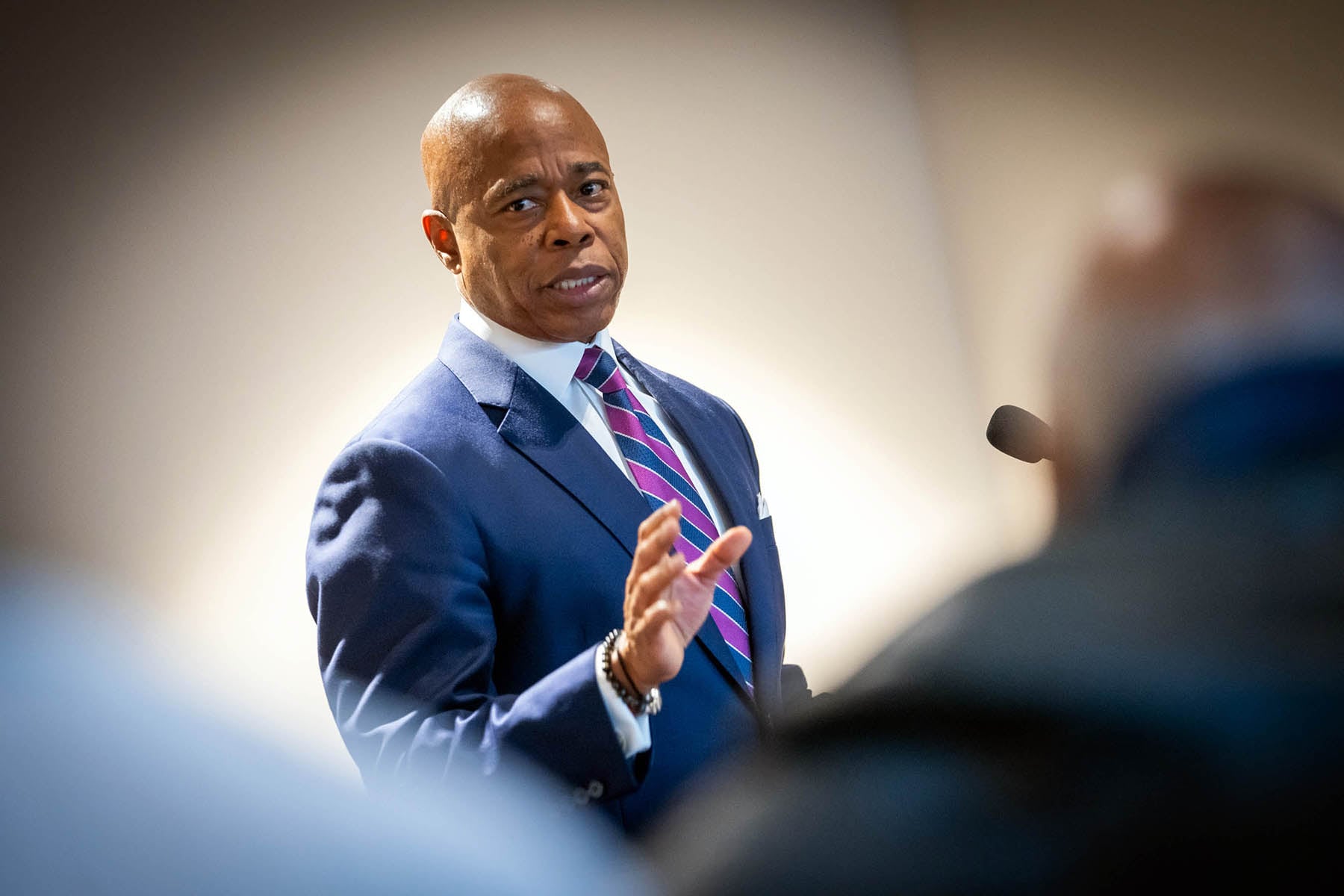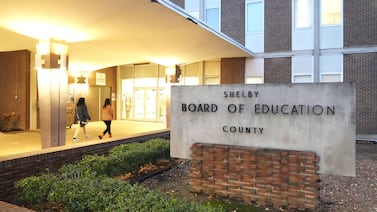Sign up for Chalkbeat New York’s free daily newsletter to keep up with NYC’s public schools.
Mayor Eric Adams is set to retain control of the city’s school system for another two years, as part of a finalized budget deal between state lawmakers and Gov. Kathy Hochul.
Under the deal, Albany officials will have a hand in selecting the head of a city education panel, and New York City officials will enter into firmer commitments on adhering to a state law requiring smaller class sizes. But observers — including a member of the panel — remain skeptical that changes to that panel will have a significant impact on the city’s schools.
For months, an extension of mayoral control in the budget seemed an unlikely prospect in Albany, as lawmakers repeatedly argued that the future of New York City’s school governance structure should be determined outside of the budget process.
But earlier this week, as last-minute negotiations over the late budget ensued, Hochul continued to push for a mayoral control extension. On Saturday, lawmakers in both houses of the Legislature passed a budget bill including the two-year extension.
“I want stability in the city,” the governor said during a Friday press conference. “I want the parents and children and teachers to know that the governance mechanism that’s been in place for many, many years will not be politicized. It will not be a political football for the next few months.
“Sometimes, you just have to step back and say, ‘We want to get this done,’” she added. “And I have a knack for figuring out who to bring together and what has to happen.”
The $237 billion state budget finally neared completion on Saturday, nearly three weeks after its April 1 deadline. It allocates roughly $36 billion in funding to the state’s schools — as well as $2.4 billion to help New York City support the recent influx of asylum-seekers and other migrant families. Hochul will still need to sign the final budget into law.
For more than 20 years, the city’s mayoral control system has largely relied on the mayor’s power to select a schools chancellor and appoint a majority of members to the Panel for Educational Policy, or PEP, a city board that votes on major policy proposals and contracts.
As part of the deal struck this week, the board will grow by one member — with the chair of the PEP appointed from a set of nominees selected by Albany officials. Senate and Assembly leaders, as well as the chancellor of the state’s Board of Regents, will nominate candidates to oversee the panel, from which the mayor will select a chair.
The city’s Education Department will also be required to make firmer commitments to meeting a state law mandating smaller class sizes — a major priority for many lawmakers that passed as part of the last mayoral control deal. That means the city will be required to construct more school buildings, as well as maintain levels of funding needed for schools to shrink class sizes.
Despite those changes, some lawmakers were displeased with the extension.
“The proper way to do this is a thoughtful deliberation and hearing more voices in the process — taking into account more opinions from education stakeholders — and that’s exactly what we had planned to do immediately after the enactment of the budget,” said state Sen. John Liu, a Queens Democrat who chairs the Senate’s New York City education committee, on Friday. “As it turns out, the governor was very insistent on including this issue, and the governor has a great deal of influence during the budget making process.
“So this decision making was clearly rushed,” he said. “It’s not best practice, but this is where we are.”
Mayoral control extension follows detailed state report
The agreement comes on the heels of a nearly 300-page state Education Department report on mayoral control, which compiled testimony from five public hearings and detailed the history of New York City school governance.
That report, which City Hall referred to as a “sham,” did not advocate directly for extending or overturning mayoral control. But it noted a majority of speakers at public hearings wanted to see the system reformed, adding they felt unheard and excluded by the current structure.
It also highlighted a series of recommendations that arose during the public’s testimony, including potential tweaks to the makeup of the PEP and a commission to consider longer-term reforms to the city’s school governance structure.
On Friday, Liu hinted that longer-term changes to the system based on the findings of the report could come in 2026 instead, when mayoral control next expires.
“It’s a long-term study over the past 20 years, and the findings and the insight that this report provides are not going to change in the next year or so,” he said. “We are going ahead with a short term extension, so you can read between the lines there.”
Education panel tweak unlikely to have major impact, observers say
The extension comes as a win for Adams, who will now retain control over the city’s schools for the entirety of his first term. In recent weeks, Adams and his administration have made repeated pitches for an extension — with schools Chancellor David Banks lobbying lawmakers in Albany and threatening to resign if the system was overturned.
Still, the PEP will see one change under the deal. Currently, the chair of the panel is elected by its voting members, a majority of which are appointed by the mayor. Under the new system, the panel will grow from 23 to 24 members, though the mayor will still retain a majority. And though the mayor will hold the final decision over who leads that panel, Adams will now choose from a pool of three candidates determined by Albany officials. (If the mayor rejects all three candidates, Albany officials may submit up to two additional sets of three nominees.)
It’s a move lawmakers say could introduce more independence from the mayor to the role.
On Saturday, Michael Mulgrew, president of the United Federation of Teachers, praised Albany officials “for their work on behalf of the children of New York.”
“Today’s state budget requires New York City to provide every school with the funding it needs to lower class sizes - a critical investment in our public schools,” he said in a statement. “While more work needs to be done on mayoral control, the introduction of independent leadership to the Panel for Educational Policy provides more checks and balances in school governance.”
But some remain skeptical about the potential impact of the PEP change.
Vanessa Leung, who served as chair of the PEP for eight years under former Mayor Bill de Blasio, said having a more independent chair could lead to “a shift in the balance of power.”
But she added it will be especially difficult for that chair to effectively oversee a 24-member PEP, maintaining relationships across its members and with the city’s Education Department.
It’s “a huge lift for one person, who may not have the time and flexibility needed,” she said.
The change to the PEP “in practice is pretty benign,” said David Bloomfield, a professor of education, law, and public policy at Brooklyn College and the CUNY Graduate Center. Though the chair holds some power over the panel’s agenda, he believes it’s likely that state officials would be “accommodating to the Mayor.”
“On the other hand, the Regents & Legislature stepping into a direct NYC school governance role is extraordinary, unique in the state and, as far as I know, the country,” he said in an email.
It’s a move that Jonathan Collins, a professor of politics and education at Columbia University’s Teachers College, noted runs counter to the findings of the state Education Department report.
“The report shows us that NYC parents and stakeholders have major concerns about how accessible and responsive the current local governing board is to their concerns and needs,” he said in a Friday email. “They want more local control, and for the time being, they’re likely getting even less.”
Collins added the shift in chair selection could give Albany leaders some influence over the city’s policy agenda.
But skepticism about the impact of the change was shared even among current members of the panel.
“If we keep the same number of mayoral appointees, at the end of the day whoever picks the chair is not going to impact how votes play out,” said Kaliris Salas-Ramirez, a current PEP member appointed by Manhattan Borough President Mark Levine. “It doesn’t really improve the dynamics of the panel, or respond to the hundreds of people that participated in mayoral control hearings talking about ending mayoral control.”
She expressed disappointment with the rapid nature of recent mayoral control negotiations — particularly in light of the recent state Education Department report.
“It’s just really, really frustrating that folks aren’t looking at the big picture,” Salas-Ramirez said. “Here we had an opportunity to really create some transformative change on how New York City public schools are governed — to create a more democratic structure, to move towards something that people are actually asking for.
“And we’re literally encapsulating it in a one week debate,” she said.
Julian Shen-Berro is a reporter covering New York City. Contact him at jshen-berro@chalkbeat.org.





